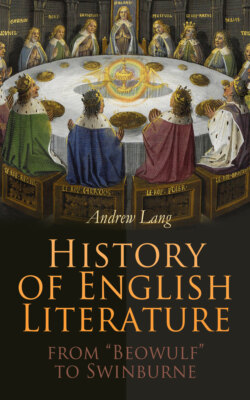Читать книгу History of English Literature from "Beowulf" to Swinburne - Andrew Lang, Robert Kirk - Страница 66
Wyclif.
ОглавлениеJohn Wyclif (born about 1329) was a man of great influence in his day; and the Reformation, when many of his ideas revived, probably found the embers of the fire which he had tended still glowing. He is said to have been born at Hipswell, near Richmond in Yorkshire, and certainly was of the Diocese of York. He was Master of Balliol College, Oxford, in 1361. In 1372 Wyclif took the degree of Doctor in Theology: he had already written not a few Latin treatises on philosophical subjects. As a philosopher he was a believer in predestination (on which much might be said), but averse to the theory of the disintegration of matter; indeed his views on this subject controlled his theory of the Eucharist. His desire to reform the Church by reducing her endowments endeared him to a political party in the State; and when he was summoned before Convocation in 1377, he was supported by John of Gaunt, uncle of Richard II.
The affair ended in a brawl; and in a later examination his ideas were not pronounced heretical. The London mob as well as some persons of high rank were on his side, and when one Pope, Urban, proclaimed a crusade against the other Pope, Clement, Wyclif opposed it in manuscript pamphlets. He had, about 1378, started a kind of order of "poor priests" who spread his doctrines, and, in regard to the unlawfulness of owning private property, went beyond him.
The Bible, not the tradition of the Church, was the centre of Wyclif's inspiration: it would be a mistake to suppose that the Bible was then generally ignored, the literature of the time is full of quotations from Scripture. There was no authorized translation of the Latin Bible, but many separate books of Scripture were circulating in English. There is much controversy as to whether or not Wyclif translated, or caused to be translated, the entire Bible, as a chronicler declares that he did: certainly he made much of it known in English tracts and sermons.
In 1382 he was suspended from teaching at Oxford; he retired to his rectory at Lutterworth, continued to write, and died on Old Year's Day, 1384.
It is impossible, here, to enter into theological details, but Wyclif anticipated many of the great multitude of ideas which flooded Western Europe at the beginning of the Reformation. If we open his sermons at random, we find him preaching on Lazarus and Dives, "how richessis be perilouse, for lightli wole a riche man use hem unto moche lust," that is, luxury. Words of Latin origin are nearly as common in his style as in that of Chaucer or Piers Plowman. In his Englishing of the Bible, Wyclif uses "And" at the beginning of many sentences, just as Mandeville does in his amusing and fabulous "Travels". The sermons have the double merit of being very short, and very plain, with no rhetorical flowers. The tracts can scarcely be called amiable: the word "stinking," for example, is not thought by Wyclif too strong to apply to "proud priests of Rome and Avignon".
All these brave and earnest men, the Wyclifite pamphleteers and "poor priests," and Piers Plowman, with their socialism and their doubts, their "New Theology," were rehearsing in mediaeval costume the drama of to-day; while Chaucer was arraying the heroes of the Fleece of Gold, of Troy, and of the Achæans, in the armour of the men who fought at Crécy and Poitiers. What remains as a gain to literature is the art of Chaucer.
Sweet reasonableness and urbane irony are not to be expected from men full of righteous indignation, and in great danger of being burned alive; for by this penalty did the Church and State suppress the preachers of doctrines which were apt to cause dangerous popular tumults. The Wyclifite Biblical translations look like a canvas later embroidered on by the authors of King James's authorized version, that immortal monument of English prose.
